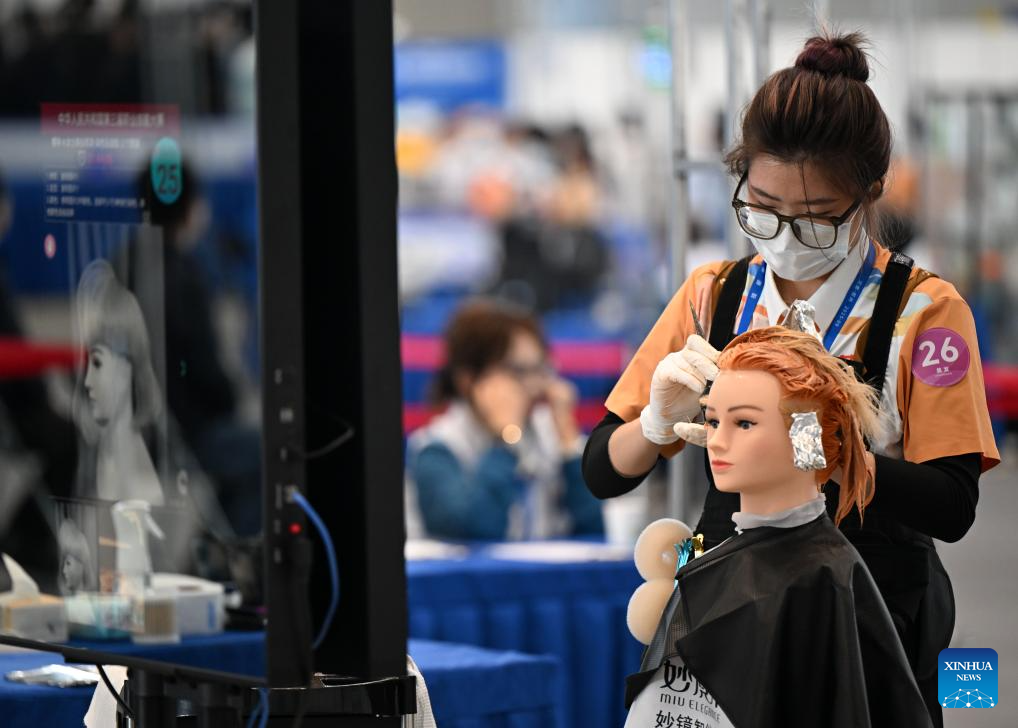Contest highlights need for skilled labor
Vocational talent are key to national innovation and space exploration


Experts have underscored the vital importance of vocational education and high-level skills in driving economic growth, fostering innovation and achieving strategic national goals.
Vocational skills development serves as a cornerstone for individual empowerment, industrial upgrading and technological self-reliance, they said, at the recently concluded 3rd Vocational Skills Competition of the People's Republic of China in Zhengzhou, Henan province, drawing widespread attention to the country's skilled talent pool.
Xie Jingrong, vice-chairman of the China Vocational Education Association, said vocational education is essential to national socioeconomic development.
He stressed that its core mission remains helping people "secure employment, find joy in work and achieve entrepreneurial success".
In his view, vocational education is uniquely positioned to bridge the gap between learning and earning, especially as industries evolve.
Still, Xie acknowledged persistent challenges: a cultural preference for academic education, a misalignment between the fast pace of industrial upgrading and slower educational adaptation, and a shortfall in the number of teachers who are truly proficient in practical skills.
He called for deeper cooperation between schools and enterprises to ensure that training closely follows the needs of industry and proactively aligns with emerging sectors.
Elaborating on the practical impact of high-level skills, Hao Chunyu, chief technician at China Aerospace Science and Technology Corporation, shared his experiences producing cable networks for major aerospace programs, including the Shenzhou spacecraft, the Tiangong space station and lunar exploration missions.
Specific breakthroughs — such as developing cables for the Chang'e-5 probe that can withstand the moon's 300 C temperature variations and reducing the weight of satellite cable networks by 36 percent for the Beidou-3 system — have illustrated how skilled technical talent can drive innovation, lower costs and help achieve technological self-reliance, he said.
Through his State-supported master training studio, Hao has also cultivated more than 40 skilled professionals using a blended training model that combines written guidelines, instructional videos and hands-on practice.
Highly skilled workers serve as a crucial cornerstone of national strength and competitiveness, and significantly contribute to national security and social development, he said.
"With our own hands, we will help fuel the magnificent journey of the Chinese nation as it explores the vast cosmos and pursues dreams among the stars."
Song Yang, deputy general manager of Zhengzhou Jiean Hi-Tech Co, said that as China's suburban railway network expands rapidly to meet intercity transportation needs, a severe shortage of skilled workers — especially train drivers — has emerged. However, this gap also presents bright career prospects for vocational education graduates, he said.
"The core issue is turning graduates into job-ready professionals quickly," Song noted.
His company has developed a 1:1 simulated train driving system, which has attracted the attention of many visitors at the national competition. This system helps shorten the training cycle: students mastering it at school only need one to two months of corporate training to start working, he said.
The career appeal is strong, too — new drivers earn 7,000 to 8,000 yuan ($983 to $1,123) monthly, and demand will grow as railway equipment upgrades.
"Skilled workers who can operate advanced technology are invaluable," Song said, adding that such roles are highly important and promising.
The push to train skilled suburban railway workers not only addresses industry needs but also highlights the value of vocational education, challenging outdated perceptions that vocational paths are less desirable than academic ones, he added.
The vocational skills competition, which concluded recently in Zhengzhou, has attracted 3,420 participants competing in 106 events. As the country's premier vocational skills event, it also serves as a selection platform for the WorldSkills Competition, underscoring the national commitment to recognizing and nurturing skilled talent.
For the first time, a special category for rural vitalization has been introduced. More than 50 percent of the events focus on smart manufacturing, the industrial internet and artificial intelligence, while 17 new professional categories highlight the latest trends in technological and skills development.
Competitors, aged 16 to 57, include young vocational students and experienced front-line technicians.
Among them, 58 percent are technical school students and 21 percent are enterprise employees. Participants with bachelor's, master's or doctoral degrees make up 33 percent of the participants, possessing qualifications with concentrations in advanced technical fields such as smart manufacturing and high-end equipment.




































